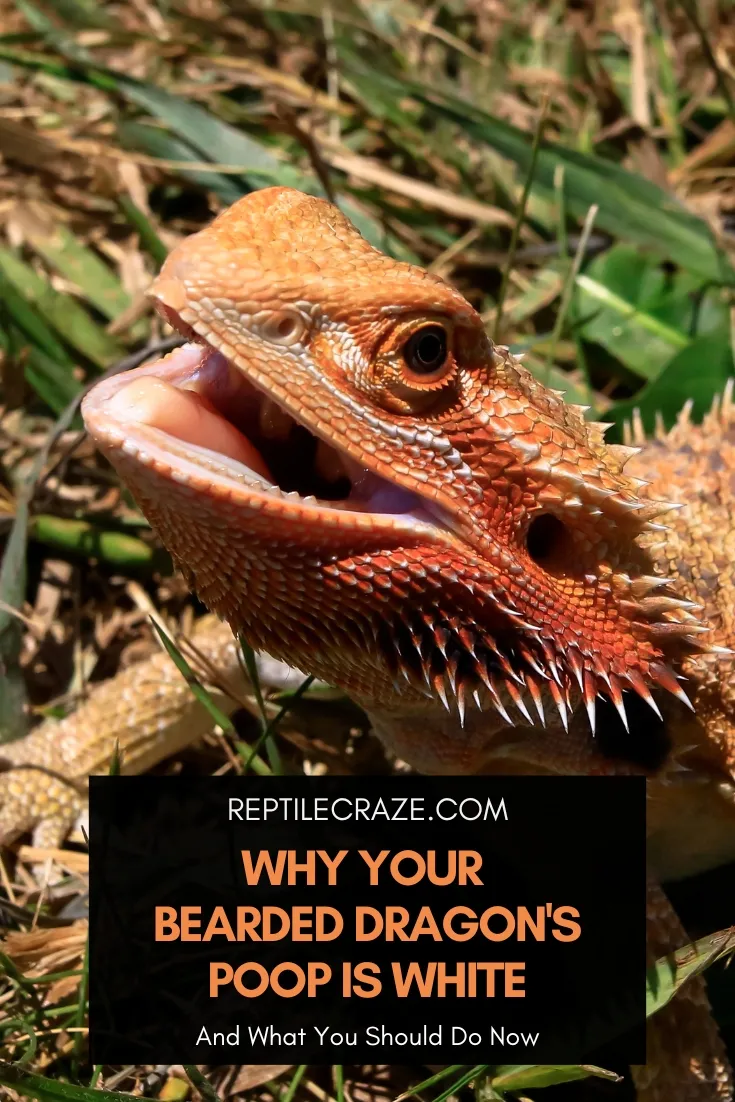
It might not be the best part of having a reptile pet, but observing any changes in feces or urates whilst checking on your beardie and performing daily cleaning, is an important part of their care. Being aware of what’s ‘normal’ for them, helps you to detect problems early and improve the chances of proper treatment.
Normal bearded dragon waste is made up of feces that are brown in color and white colored urates. Reasons for your bearded dragon’s feces being white include: over-hydration, decreased
In this article, we’ll explain reasons why a bearded dragon’s feces can be white and when this could require veterinary treatment. We’ll also suggest things you can do to help your beardie at home.
Is It Bad If My Bearded Dragon’s Poop Is White?
Bearded dragon poop is usually brown in color, semi-solid, soft, log-shaped, and will not smell. The color can vary a little bit depending on your beardie’s last meal.
It’s normal to have a white component on one end of the poop, this part is called urate.
Your beardie’s poop can look a little different due to a variety of factors, so it’s important to take the whole picture into consideration when thinking about whether they could be sick.
It’s not necessarily bad if your bearded dragon’s poop is white, but it depends on the circumstances.
For example, occasional white poop, related to changes in diet (which we’ll discuss later) isn’t something to worry about.
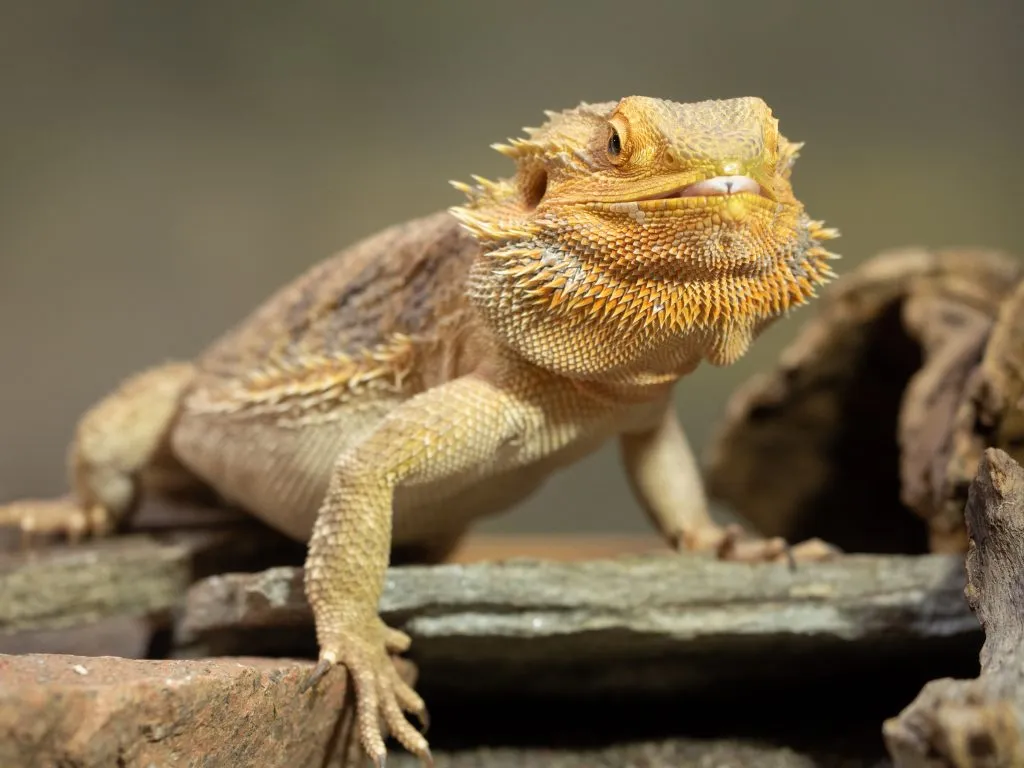
However, if your beardie regularly has white poop, then it could be a sign that something is wrong or that you need to change something in their care routine.
If your beardie’s white poop is combined with other changes, then it’s best to take them to a reptile veterinarian for proper diagnosis and treatment.
We’ve listed some examples of symptoms that require veterinary intervention below (source):
- Changes in breathing, such as coughing, wheezing, or noisy breathing
- Discharge (material) exiting or surrounding the eyes, nose, ears, or mouth
- Changes in weight or body condition
- Changes in the condition of skin or eyes
- Decreased activity level or hiding more than usually
- Vomiting or diarrhea
- Neurological symptoms such as shaking, a head tilt, and problems with balance.
Disclaimer: Please refer to the above list as a guide only. If you think your bearded dragon could be sick, take them to a reptile veterinarian for a proper diagnosis and treatment.
You can read more about diseases in beardies in our article ‘8 Signs Your Bearded Dragon Is Dying‘.
Why Is My Bearded Dragon’s Poop White?
Now we’ve reminded ourselves about what normal beardie feces look like, let’s look at some possible reasons why it could be white.
Don’t forget to take into account your beardie’s diet and the frequency, consistency, and smell of their poop when considering whether your beardie could be sick.
1. Your Bearded Dragon Is Pooping Urates Only
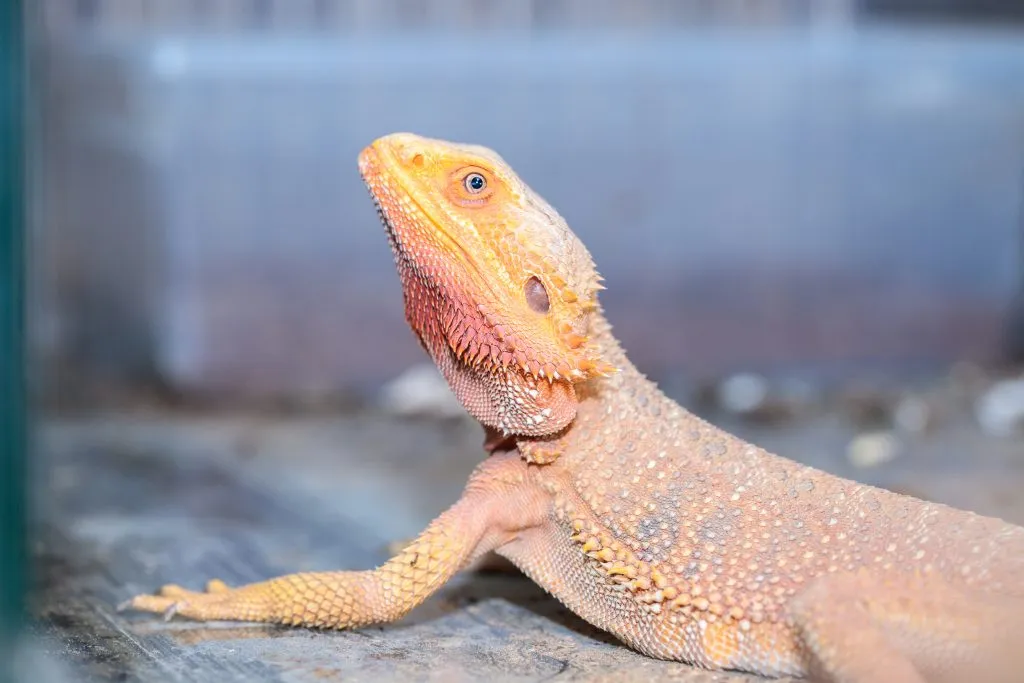
Beardies don’t urinate, instead, they concentrate their urine into a substance called urate, which is white to yellow in color because of the minerals it contains.
Urate has a pasty consistency and should always accompany your beardie’s poop.
It’s normal for your beardie’s poop to have a white urate component. If your bearded dragon’s poop is completely white, it could be possible that they’re actually not pooping at all, and instead what you see is only urate.
Reasons for a bearded dragon excreting urate in the absence of poop, are:
- over-hydration
- lack of
food in their digestive system - too much calcium
If your bearded dragon had a lot to drink lately and is over-hydrated, it could be that its kidneys are working especially hard and, hence, more urate than normal is produced.
If you notice that your beardie is drinking more than usual, it’s best to consult a reptile veterinarian, as it could be linked to a disease.
Another reason for beardies only excreting urate, could be that they are under-eating. This could also be related to an illness or if you forgot to feed them.
A beardie might also go off their
This is likely to be the cause if you notice other signs of stress in your beardie, such as a black beard or stress marks.
Finally, excess calcium in the diet can also mean that increased urate is produced, and hence the feces look white.
Tip: Also read our article on why beardies always poop in food or water bowls here!
If a beardie eats more calcium than they need, their urate can contain more calcium than usual, and hence become white.
In this case, the urate might also be more dry or chalky as a result of its increased calcium content.
When supplementing your beardie’s diet, always pay attention to the guidelines given by the manufacturer to ensure you use it appropriately.
What To Do About It
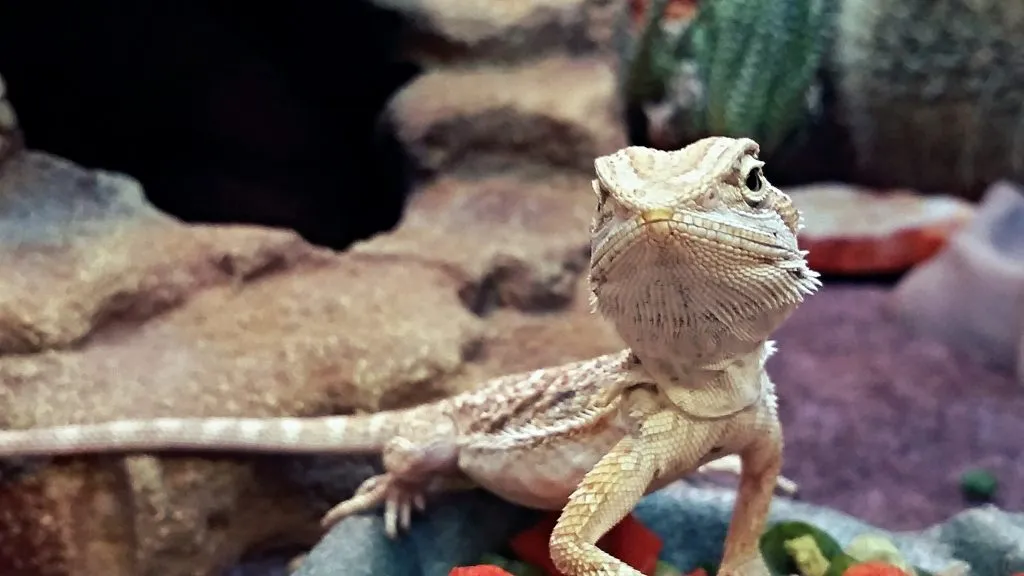
If you think your beardie’s poop is completely white due to overhydration, unless you suspect they may be sick or it lasts for a long time, you don’t need to worry.
Perhaps they recently had a bath and drank a lot of water, or they enjoyed some foods with a high water content.
If you think your beardie’s poop is completely white due to lack of
If you think your beardie’s feces are white because of excess calcium, then you can try decreasing the amount of calcium in their diet.
You can do this by reducing the amount of supplementation you give them, or by feeding them less calcium-rich plant matter.
2. Parasites
Parasites such as coccidia or pinworms can change your beardie’s poop and cause it to look more white than normal.
You might not be able to see the actual parasites, but any changes in the color or consistency of a bearded dragon’s poop could suggest that they’re infected with parasites.
Other signs that your beardie could be suffering from gastrointestinal parasites include:
- Weight loss
- Dehydration
- Diarrhea
- Vomiting
- Decreased appetite
- Decreased activity
You can read about bearded dragon gastrointestinal parasites in more detail in our article ‘How Long Can Bearded Dragons Live With Parasites?‘.
What To Do About It
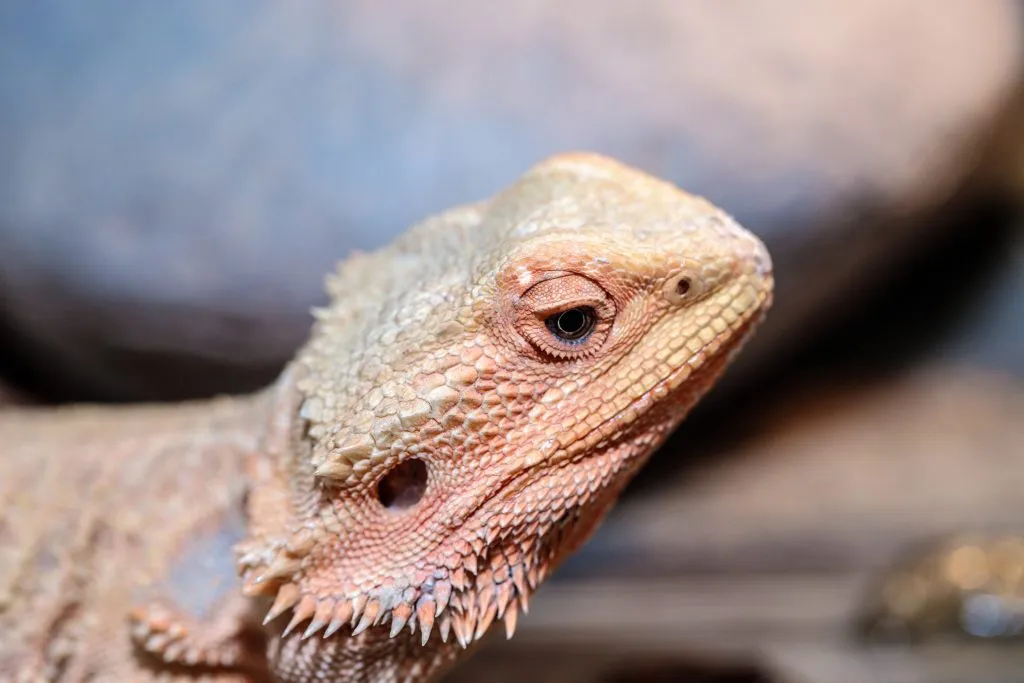
Parasitological infections in bearded dragons require proper diagnosis and treatment. This will require taking your beardie and a poop sample to a reptile veterinarian.
After the analysis, they’ll be able to recommend a suitable anti-parasite treatment. You’ll also need to disinfect their
When it comes to parasites, the best practice is to reduce the burden of infections by regularly de-worming your beardie, keeping their environment clean, and giving fecal samples to your veterinarian for regular testing.
Always wash your hands after touching your bearded dragon or the components of its enclosure. Wear gloves when collecting poop samples and put the poop in a secure plastic container.
3. Dehydration
Regular baths are important for a bearded dragon for a few reasons. Since beardies like to drink during bath time, it helps to keep them hydrated.
By not giving a beardie the opportunity to bathe regularly, you run the risk that they can become dehydrated.
Dehydration can also be linked to inadequate
Tip: Also read our article on why your beardie isn’t pooping and what you can do to make him or her poop again.
You can check for dehydration by performing the skin fold test. To do this, carefully move a fold of skin away from your beardie’s body.
It should return back to place quickly, if it takes a while to go back then your beardie is probably dehydrated.
If your beardie is only slightly dehydrated you might see some string-like mucus component to their feces. If they are very dehydrated then as well as being white, their poop will also be very dry.
What To Do About It
Re-hydrate them by:
- bathing them
- misting their enclosure
- misting their
food - offering water-rich
food items such as green vegetables, leafy greens, and fruit - checking and correcting the environmental parameters within their
tank (especially humidity and temperature).
Be aware, the above tips may only be effective if your beardie is mildly dehydrated. If your bearded dragon is severely dehydrated, it will need to be taken to a reptile veterinarian for treatment.
Disclaimer: Please refer to the above points as a guide only. If you think your beardie is sick, take them to a reptile veterinarian for proper diagnosis and treatment.
What To Do If You See Changes In Your Bearded Dragon’s Poop
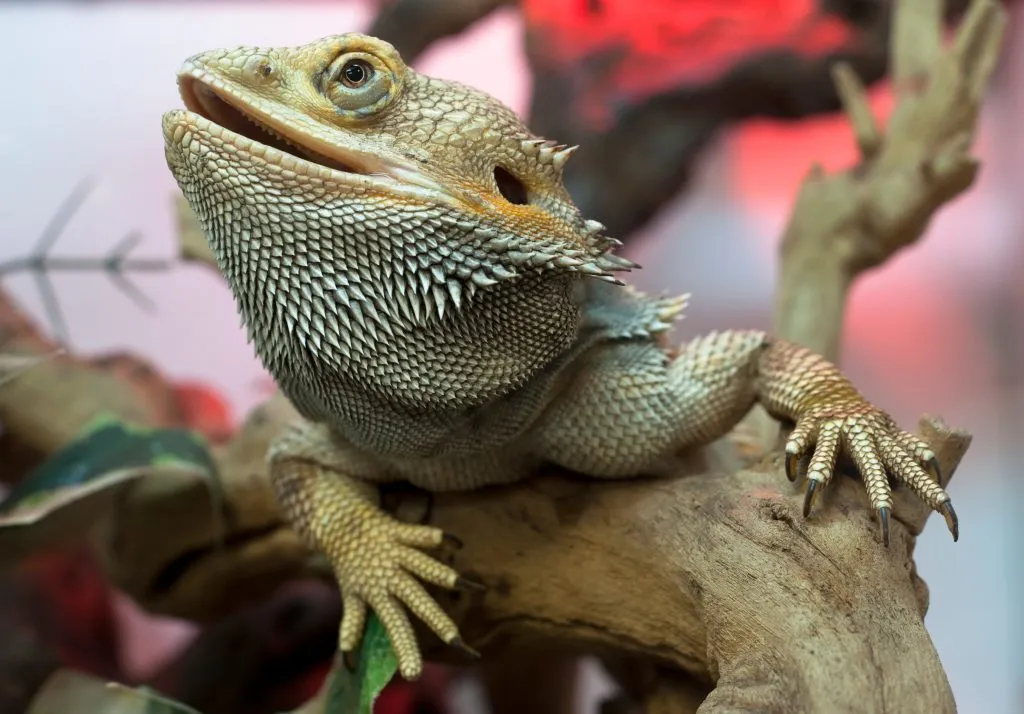
If you notice any kind of change in your beardie’s poop, don’t panic!
Unless it has been going on for a while, or it’s accompanied by other symptoms there are a few things you can do to see if you can help them at home, before seeking veterinary advice.
However, if the poop changes have been present for a while, or your beardie is showing some other signs of sickness, then it’s best to take them to a reptile veterinarian straight away.
Below we’ve created a checklist you can work through if you’ve noticed some changes in your bearded dragon’s poop:
- Check and correct all the environmental parameters in their
tank (don’t forget that temperature and humidity have a direct influence on a beardie’s digestion) - Refer to a feeding guide for beardies to ensure they are getting all the correct nutrients in the appropriate amounts and alter the diet accordingly
- Think about whether they could benefit from a bath or fecal parasite check
- Discuss the changes with a reptile veterinarian.
You can read more about caring for your beardie in our article ‘Bearded Dragon Care Guide: Diet, Housing, Facts‘.
Conclusion
Noticing changes in your beardie’s poop is an important part of their daily care and helps to monitor their health status. It can even give clues as to whether you’re feeding or housing them appropriately.
Have you had a memorable experience with bearded dragon poop? Tell us about it in the comments below.
Also read: Why is my bearded dragon’s poop green?
- Enchi Ball Python: A Unique and Stunning Morph of Python regius - March 27, 2025
- Emerald Tree Monitor: The Enigmatic Green Guardian of the Rainforest - March 26, 2025
- The Egyptian Cobra (Naja haje): A Fascinating Serpent - March 25, 2025
